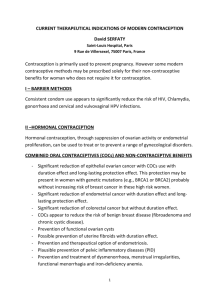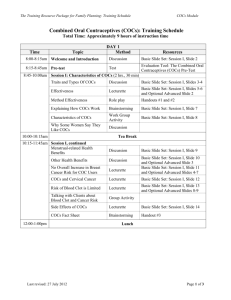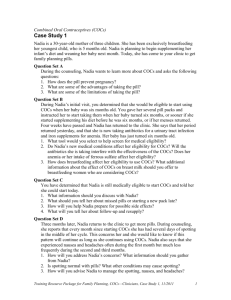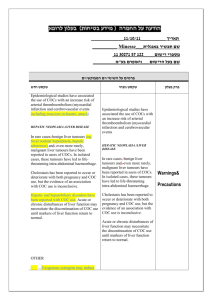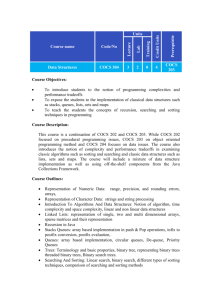Combined Oral Contraceptives (COCs)
advertisement
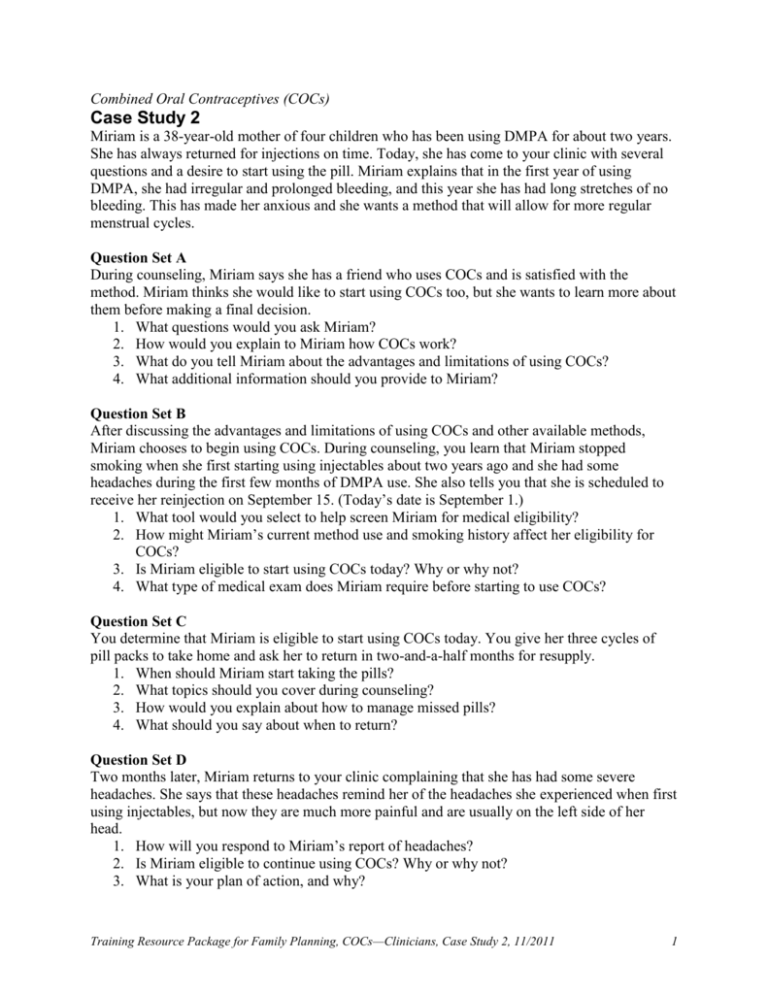
Combined Oral Contraceptives (COCs) Case Study 2 Miriam is a 38-year-old mother of four children who has been using DMPA for about two years. She has always returned for injections on time. Today, she has come to your clinic with several questions and a desire to start using the pill. Miriam explains that in the first year of using DMPA, she had irregular and prolonged bleeding, and this year she has had long stretches of no bleeding. This has made her anxious and she wants a method that will allow for more regular menstrual cycles. Question Set A During counseling, Miriam says she has a friend who uses COCs and is satisfied with the method. Miriam thinks she would like to start using COCs too, but she wants to learn more about them before making a final decision. 1. What questions would you ask Miriam? 2. How would you explain to Miriam how COCs work? 3. What do you tell Miriam about the advantages and limitations of using COCs? 4. What additional information should you provide to Miriam? Question Set B After discussing the advantages and limitations of using COCs and other available methods, Miriam chooses to begin using COCs. During counseling, you learn that Miriam stopped smoking when she first starting using injectables about two years ago and she had some headaches during the first few months of DMPA use. She also tells you that she is scheduled to receive her reinjection on September 15. (Today’s date is September 1.) 1. What tool would you select to help screen Miriam for medical eligibility? 2. How might Miriam’s current method use and smoking history affect her eligibility for COCs? 3. Is Miriam eligible to start using COCs today? Why or why not? 4. What type of medical exam does Miriam require before starting to use COCs? Question Set C You determine that Miriam is eligible to start using COCs today. You give her three cycles of pill packs to take home and ask her to return in two-and-a-half months for resupply. 1. When should Miriam start taking the pills? 2. What topics should you cover during counseling? 3. How would you explain about how to manage missed pills? 4. What should you say about when to return? Question Set D Two months later, Miriam returns to your clinic complaining that she has had some severe headaches. She says that these headaches remind her of the headaches she experienced when first using injectables, but now they are much more painful and are usually on the left side of her head. 1. How will you respond to Miriam’s report of headaches? 2. Is Miriam eligible to continue using COCs? Why or why not? 3. What is your plan of action, and why? Training Resource Package for Family Planning, COCs—Clinicians, Case Study 2, 11/2011 1 Combined Oral Contraceptives Case Study 2—Answer Key Knowledge and Skills Objectives Addressed by COCs Case Study 2 1. Describe the characteristics of COCs in a manner that clients can understand 2. Screen clients for medical eligibility for COC use 3. Describe when to initiate COCs 4. Demonstrate the ability to: a. Explain to clients how to use COCs and what to do when pills are missed. b. Explain when to return to the clinic (e.g., for complications associated with blood clots). c. Address common concerns, misconceptions, and myths d. Conduct follow-up for COC clients in a way that enhances continuing safety, satisfaction, and acceptance 6. Identify new conditions that may require a client to switch to another method or to temporarily stop COC use Answers to Question Set A 1. What questions would you ask Miriam? Do you want more children in the future or do you want to stop having children altogether? Do you think you will remember to take a pill every day? Would you like me to tell you about other available methods that would allow for regular periods? 2. How would you explain to Miriam how COCs work? COCs contain low doses of estrogen and a progestin, similar to the hormones in a woman’s body. COCs work in two primary ways. First, they prevent the release of an egg from the ovary (ovulation). Without an egg, sperm have nothing to fertilize. Second, they cause the mucus in the cervix (entrance to the uterus) to become thick. This makes it more difficult for sperm to enter the uterus and fertilize an egg, if ovulation were to take place. 3. What do you tell Miriam about the advantages and limitations of using COCs? Advantages include: They are very effective in preventing pregnancies. They are safe for almost everyone. Fertility returns right after stopping use of the pills. Monthly periods are regular, light, and cramping is reduced. They have health benefits in addition to pregnancy prevention. Limitations include: They are less effective as commonly used (when a woman occasionally forgets to take her pills on schedule). Side effects (nausea, headaches, spotting, and breast tenderness) can occur. They may cause complications, although this is very rare and occurs mostly in women who already have certain serious health problems. 4. What other information should you provide to Miriam? COCs do not provide protection from STIs, including HIV, so if she thinks she may be at risk of exposure to STIs, she should use condoms in addition to COCs. Training Resource Package for Family Planning, COCs—Clinicians, Case Study 2, 11/2011 2 Answers to Question Set B 1. What tool would you select to help screen Miriam for medical eligibility? The Checklist for Screening Clients Who Want to Initiate Combined Oral Contraceptives (COCs), or the WHO Medical Eligibility Criteria Wheel for Contraceptive Use, or the Quick Reference Chart for the WHO Medical Eligibility Criteria for Contraceptive Use. 2. How might Miriam’s current method use and smoking history affect her eligibility for COCs? Miriam should be congratulated on her choice to stop smoking, and the following information should be shared with Miriam in the event that she does decide to smoke again in the future. Women age 35 and older who smoke should not use COCs because COCs may increase their risk for blood clots. Miriam should be urged not to start smoking again. 3. Is Miriam eligible to start using COCs today? Why or why not? Since she has been receiving DMPA injections on time, you can be reasonably sure Miriam is not pregnant. Because she came to the clinic during her reinjection window for DMPA, which starts two weeks before her scheduled reinjection date, she is eligible to start using COCs today. There is no need for her to use a backup method, because she will be protected from pregnancy by her previous DMPA injection for another six weeks. 4. What type of medical exam does Miriam require before starting to use COCs? No medical exams are required for starting to use COCs. If you have the means to take her blood pressure you should do so; if not, this should not preclude her from starting COCs. Answers to Question Set C 1. When should Miriam start taking the pills? She can start today, the first day of her reinjection window for DMPA. Clients who are switching from using injectables may start COCs during the reinjection window for their next injection. 2. What topics should you cover during counseling? Safety and effectiveness How COCs work How to take the pills and what to do when pills are missed The importance of taking a pill every day Health benefits Side effects That COCs do not protect against STIs/HIV and the need to use condoms if at risk of infection. Warning signs of possible complications and reasons to return 3. How would you explain about how to manage missed pills? Take one pill each day, preferably at the same time each day. This makes it easier to remember. The chance of nausea is less if pills are taken with food. If you miss active pills one or two days in a row or start a pack one or two days late: Always take a pill as soon as you remember, and continue taking one pill each day. Depending on when you remember that you missed a pill(s), you may take two pills on the same day—one at the moment you remember and the other at the regular time—or even at the same time. There is no need for additional contraceptive protection. Training Resource Package for Family Planning, COCs—Clinicians, Case Study 2, 11/2011 3 If you miss three or more active pills in a row or start a pack three or more days late: Take a pill as soon as possible, continue taking one pill each day, and use condoms or avoid sex for the next seven days. In addition, if you missed these pills in week three, finish the active pills in the pack and start a new pack. Throw away the inactive pills. Also if you had sex within the last five days, consider using emergency contraception. If you miss any inactive (nonhormonal) pills, throw away the missed pills and continue taking pills, one each day. 4. What should you say about when to return? Instruct Miriam to return anytime she has problems, questions, or concerns or if she experiences any warning signs of potential complications, including sharp pains in the abdomen, chest, or leg; severe headache; or blurred vision or loss of vision. If she experiences any of these symptoms, she should stop taking the pills, use a backup method, and return to the clinic immediately. Answers to Question Set D 1. How will you respond to Miriam’s report of headaches? Ask about the severity and frequency of the headaches and about any visual symptoms she may be experiencing to better understand her headaches. Her description indicates that she may be experiencing migraine headaches. 2. Is Miriam eligible to continue using COCs? Why or why not? No. Regardless of age, a woman who develops migraine headaches, with or without aura or whose migraine headaches become worse while using COCs should stop using them. 3. What is your plan of action, and why? Tell her to stop taking COCs. Give her a backup method. Help her choose a method without hormones. Because Miriam did not tolerate amenorrhea while using injectables, implants—the only other available hormonal method without estrogen that she has not tried—would not be a good choice for her. The provider might discuss the IUD, condoms, or sterilization, depending on her fertility intentions. Refer her for treatment of migraines. Note: The recommendations provided in the Answer Key comply with the guidance in Family Planning: A Global Handbook for Providers (2011 update). If national guidelines are available and provide guidance on these topics, participants should follow the recommendations in the national guidelines. Training Resource Package for Family Planning, COCs—Clinicians, Case Study 2, 11/2011 4

